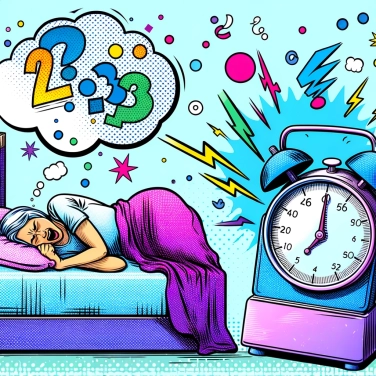Lack of sleep disrupts hunger and satiety hormones, increasing appetite and promoting weight gain. Additionally, lack of sleep can lead to a decrease in metabolism, which can also contribute to weight gain.

When you don't get enough sleep, your body slightly disrupts the hormones responsible for managing hunger. Ghrelin, the one that screams "I'm hungry!", skyrockets and drives you to eat more than necessary. In contrast, leptin, which is supposed to curb your appetite by signaling to your brain that you are full, drops sharply. The result: you eat more without really realizing it, and you are then quite easily at risk of gaining excess weight.
When you lack sleep, your body tends to slow down the way it burns calories, known as the basal metabolism. This means that even at rest, you burn less energy. Naturally, you store fat more easily instead of using it as fuel. Your body also becomes less efficient at managing blood sugar, thus promoting insulin resistance, which makes fat storage, especially around the belly, more likely. In short, less sleep = less efficient body, calories burned slowly, and easier fat storage.
Insufficient sleep directly alters our food preferences. Without proper sleep, the brain craves more fatty, sugary, or salty foods, leading to frequent and hard-to-control cravings. In short, when tired, you’re more likely to give in to snacks, cookies, or sugary drinks. Less sleep also affects the brain areas related to decision-making. As a result, we resist less and give in more quickly to comfort foods at the expense of healthy foods like vegetables or fruits. This is a guaranteed path to an unbalanced and often overly caloric diet.
When you lack sleep, your body is exhausted, and you easily lose your motivation to move and exercise. Your energy drops, so it makes sense that you move significantly less. You spend more time sitting or slumped on a couch. As a result, you burn fewer calories daily, which inevitably leads to weight gain. Your usual pace becomes slow, you feel heavy and lazy, and the slightest effort seems enormous. This vicious cycle causes fatigue to settle in for the long term and further exacerbates the lack of physical activity. The less you exert yourself, the more you store your unused energy in the form of fat.
Lack of sleep stresses the body and increases the production of cortisol, the stress hormone. When cortisol rises, we often feel an irresistible craving for fatty and sugary foods, typical comfort foods in times of stress. We snack more, choose higher-calorie foods, and these small deviations can quickly become hard-to-control habits. Furthermore, when we are stressed, we tend to eat more impulsively, without really listening to our true hunger, which clearly promotes weight gain in the long term.
One night of insufficient sleep can significantly increase appetite, particularly the craving for carbohydrate- and fat-rich foods.
On average, people who sleep less than 5 hours a night consume about 300 additional calories per day compared to those who sleep at least 7 hours.
Insufficient sleep increases cortisol production, known as the 'stress hormone', which can promote the storage of abdominal fat.
Being exposed to the blue light from screens before bedtime can reduce the natural secretion of melatonin by up to two hours, thereby delaying sleep onset and indirectly promoting weight gain.
Sleep deprivation can affect both sexes, but studies sometimes suggest a slightly higher vulnerability in women due to specific hormonal variations. However, good sleep hygiene is essential for everyone.
A short nap of about 20 to 30 minutes can temporarily improve alertness and reduce fatigue. However, it does not fully compensate for nighttime sleep deprivation nor does it completely mitigate the risks associated with weight gain.
After a bad night of sleep, prioritize foods that are rich in protein, fiber, and healthy fats (such as dried fruits, green vegetables, eggs, or nuts). These foods better regulate appetite and reduce temptations to eat sweets or fatty foods.
Catching up on sleep during the weekend can partially help with rest and recovery. However, this practice is not enough to compensate for the full physiological impact of regularly insufficient sleep, particularly regarding weight gain or metabolic imbalances.
On average, adults should aim for between 7 and 9 hours of sleep per night. Regularly getting less than 7 hours of sleep can lead to hormonal disruptions and may contribute to weight gain.

No one has answered this quiz yet, be the first!' :-)
Question 1/5